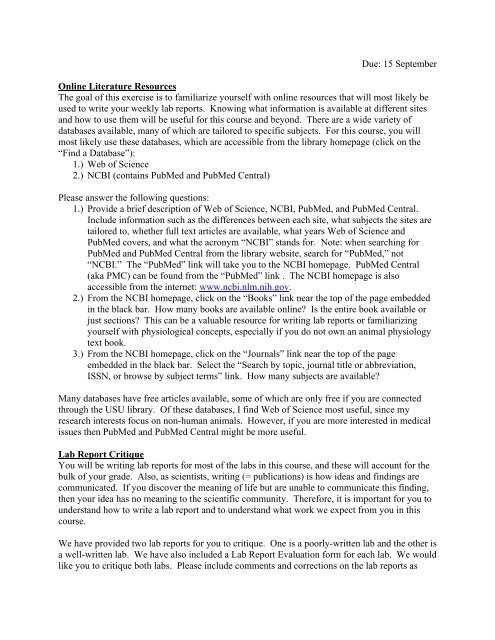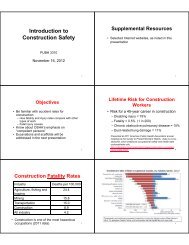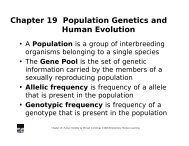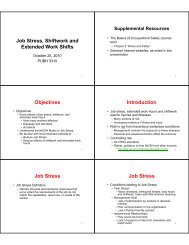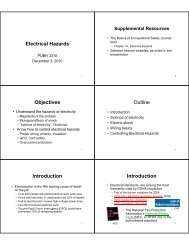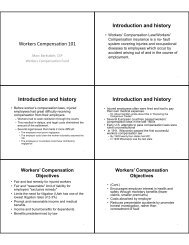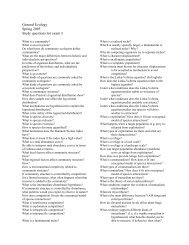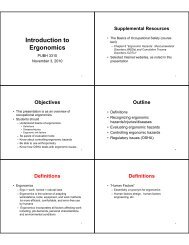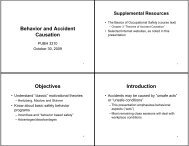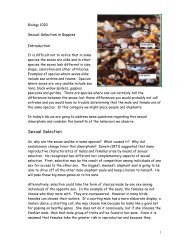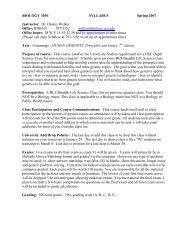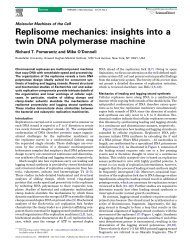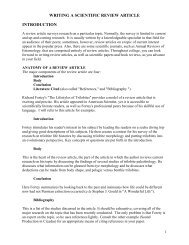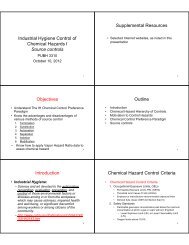Internet and Lab Report Assignment
Internet and Lab Report Assignment
Internet and Lab Report Assignment
Create successful ePaper yourself
Turn your PDF publications into a flip-book with our unique Google optimized e-Paper software.
Due: 15 September<br />
Online Literature Resources<br />
The goal of this exercise is to familiarize yourself with online resources that will most likely be<br />
used to write your weekly lab reports. Knowing what information is available at different sites<br />
<strong>and</strong> how to use them will be useful for this course <strong>and</strong> beyond. There are a wide variety of<br />
databases available, many of which are tailored to specific subjects. For this course, you will<br />
most likely use these databases, which are accessible from the library homepage (click on the<br />
“Find a Database”):<br />
1.) Web of Science<br />
2.) NCBI (contains PubMed <strong>and</strong> PubMed Central)<br />
Please answer the following questions:<br />
1.) Provide a brief description of Web of Science, NCBI, PubMed, <strong>and</strong> PubMed Central.<br />
Include information such as the differences between each site, what subjects the sites are<br />
tailored to, whether full text articles are available, what years Web of Science <strong>and</strong><br />
PubMed covers, <strong>and</strong> what the acronym “NCBI” st<strong>and</strong>s for. Note: when searching for<br />
PubMed <strong>and</strong> PubMed Central from the library website, search for “PubMed,” not<br />
“NCBI.” The “PubMed” link will take you to the NCBI homepage. PubMed Central<br />
(aka PMC) can be found from the “PubMed” link . The NCBI homepage is also<br />
accessible from the internet: www.ncbi.nlm.nih.gov.<br />
2.) From the NCBI homepage, click on the “Books” link near the top of the page embedded<br />
in the black bar. How many books are available online? Is the entire book available or<br />
just sections? This can be a valuable resource for writing lab reports or familiarizing<br />
yourself with physiological concepts, especially if you do not own an animal physiology<br />
text book.<br />
3.) From the NCBI homepage, click on the “Journals” link near the top of the page<br />
embedded in the black bar. Select the “Search by topic, journal title or abbreviation,<br />
ISSN, or browse by subject terms” link. How many subjects are available?<br />
Many databases have free articles available, some of which are only free if you are connected<br />
through the USU library. Of these databases, I find Web of Science most useful, since my<br />
research interests focus on non-human animals. However, if you are more interested in medical<br />
issues then PubMed <strong>and</strong> PubMed Central might be more useful.<br />
<strong>Lab</strong> <strong>Report</strong> Critique<br />
You will be writing lab reports for most of the labs in this course, <strong>and</strong> these will account for the<br />
bulk of your grade. Also, as scientists, writing (= publications) is how ideas <strong>and</strong> findings are<br />
communicated. If you discover the meaning of life but are unable to communicate this finding,<br />
then your idea has no meaning to the scientific community. Therefore, it is important for you to<br />
underst<strong>and</strong> how to write a lab report <strong>and</strong> to underst<strong>and</strong> what work we expect from you in this<br />
course.<br />
We have provided two lab reports for you to critique. One is a poorly-written lab <strong>and</strong> the other is<br />
a well-written lab. We have also included a <strong>Lab</strong> <strong>Report</strong> Evaluation form for each lab. We would<br />
like you to critique both labs. Please include comments <strong>and</strong> corrections on the lab reports as
though you were editing the paper. These comments/corrections can be grammatical (i.e.<br />
incomplete sentences), conceptual (i.e. poor development of content in the intro), <strong>and</strong>/or<br />
structural (i.e. disorganized presentation of the results). Be thorough with your comments, but<br />
not excessive. We suggest using the “<strong>Lab</strong> <strong>Report</strong> Guidelines” h<strong>and</strong>out as a guide to help you<br />
write the critiques. When you have finished reading <strong>and</strong> commenting on both lab reports,<br />
complete a <strong>Lab</strong> <strong>Report</strong> Evaluation form for each report. Include at least 5 comments that show<br />
your underst<strong>and</strong>ing of what makes for poorly- <strong>and</strong> well-written lab reports. In other words, your<br />
comments should justify why you gave the report a particular grade. Since writing can be<br />
subjective, there is no correct “answer” for your critique; however, you will be graded on your<br />
effort so please do a thorough job.


